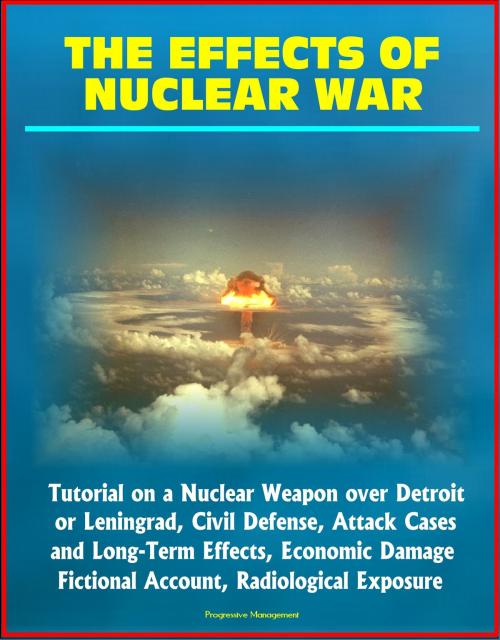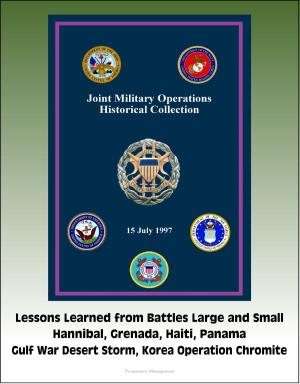The Effects of Nuclear War: Tutorial on a Nuclear Weapon over Detroit or Leningrad, Civil Defense, Attack Cases and Long-Term Effects, Economic Damage, Fictional Account, Radiological Exposure
Nonfiction, History, Military, Nuclear Warfare| Author: | Progressive Management | ISBN: | 9781301026074 |
| Publisher: | Progressive Management | Publication: | March 19, 2013 |
| Imprint: | Smashwords Edition | Language: | English |
| Author: | Progressive Management |
| ISBN: | 9781301026074 |
| Publisher: | Progressive Management |
| Publication: | March 19, 2013 |
| Imprint: | Smashwords Edition |
| Language: | English |
This study from 1979 examines the full range of effects that nuclear war would have on civilians: direct effects from blast and radiation; and indirect effects from economic, social, and political disruption. Particular attention is devoted to the ways in which the impact of a nuclear war would extend over time. Two of the study's principal findings are that conditions would continue to get worse for some time after a nuclear war ended, and that the effects of nuclear war that cannot be calculated in advance are at least as important as those which analysts attempt to quantify. This report provides essential background for a range of issues relating to strategic weapons and foreign policy. It translates what is generally known about the effects of nuclear weapons into the best available estimates about the impact on society if such weapons were used. It calls attention to the very wide range of impacts that nuclear weapons would have on a complex industrial society, and to the extent of uncertainty regarding these impacts.
Nuclear war is not a comfortable subject. Throughout all the variations, possibilities, and uncertainties that this study describes, one theme is constant — a nuclear war would be a catastrophe. A militarily plausible nuclear attack, even "limited, " could be expected to kill people and to inflict economic damage on a scale unprecedented in American experience; a large-scale nuclear exchange would be a calamity unprecedented in human history. The mind recoils from the effort to foresee the details of such a calamity, and from the careful explanation of the unavoidable uncertainties as to whether people would die from blast damage, from fallout radiation, or from starvation during the following winter. But the fact remains that nuclear war is possible, and the possibility of nuclear war has formed part of the foundation of international politics, and of U.S. policy, ever since nuclear weapons were used in 1945.
The premise of this study is that those who deal with the large issues of world politics should understand what is known, and perhaps more importantly what is not known, about the likely consequences if efforts to deter and avoid nuclear war should fail. Those who deal with policy issues regarding nuclear weapons should know what such weapons can do, and the extent of the uncertainties about what such weapons might do.
Contents * I. Executive Summary * Il. A Nuclear Weapon Over Detroit or Leningrad: A Tutorial on the Effects of Nuclear Weapons * Ill. Civil Defense * IV. Three Attack Cases * V. Other Long-Term Effects * Appendixes: * A. Letter From Senate Foreign Relations Committee Requesting the Study. * B. Strategic Forces Assumed * C. Charlottesville: A Fictional Account * D. Summary of Contractor Report on Executive Branch Studies * E. Suggestions for Further Reading * F. Glossary
This study from 1979 examines the full range of effects that nuclear war would have on civilians: direct effects from blast and radiation; and indirect effects from economic, social, and political disruption. Particular attention is devoted to the ways in which the impact of a nuclear war would extend over time. Two of the study's principal findings are that conditions would continue to get worse for some time after a nuclear war ended, and that the effects of nuclear war that cannot be calculated in advance are at least as important as those which analysts attempt to quantify. This report provides essential background for a range of issues relating to strategic weapons and foreign policy. It translates what is generally known about the effects of nuclear weapons into the best available estimates about the impact on society if such weapons were used. It calls attention to the very wide range of impacts that nuclear weapons would have on a complex industrial society, and to the extent of uncertainty regarding these impacts.
Nuclear war is not a comfortable subject. Throughout all the variations, possibilities, and uncertainties that this study describes, one theme is constant — a nuclear war would be a catastrophe. A militarily plausible nuclear attack, even "limited, " could be expected to kill people and to inflict economic damage on a scale unprecedented in American experience; a large-scale nuclear exchange would be a calamity unprecedented in human history. The mind recoils from the effort to foresee the details of such a calamity, and from the careful explanation of the unavoidable uncertainties as to whether people would die from blast damage, from fallout radiation, or from starvation during the following winter. But the fact remains that nuclear war is possible, and the possibility of nuclear war has formed part of the foundation of international politics, and of U.S. policy, ever since nuclear weapons were used in 1945.
The premise of this study is that those who deal with the large issues of world politics should understand what is known, and perhaps more importantly what is not known, about the likely consequences if efforts to deter and avoid nuclear war should fail. Those who deal with policy issues regarding nuclear weapons should know what such weapons can do, and the extent of the uncertainties about what such weapons might do.
Contents * I. Executive Summary * Il. A Nuclear Weapon Over Detroit or Leningrad: A Tutorial on the Effects of Nuclear Weapons * Ill. Civil Defense * IV. Three Attack Cases * V. Other Long-Term Effects * Appendixes: * A. Letter From Senate Foreign Relations Committee Requesting the Study. * B. Strategic Forces Assumed * C. Charlottesville: A Fictional Account * D. Summary of Contractor Report on Executive Branch Studies * E. Suggestions for Further Reading * F. Glossary















